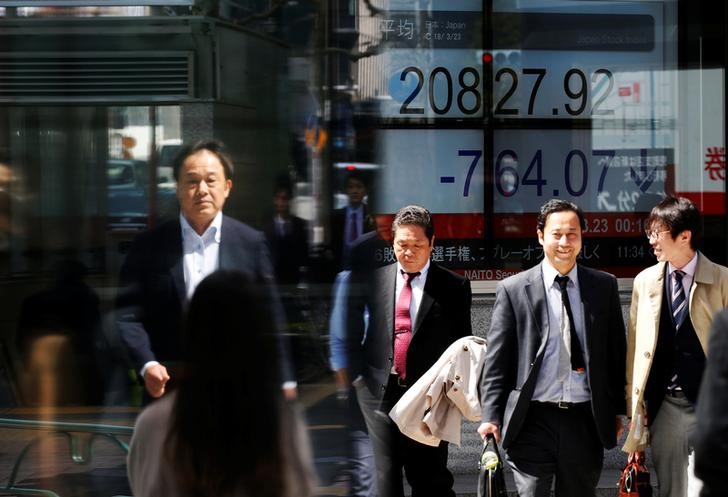By Wayne Cole
SYDNEY (Reuters) - Asia share markets skidded and the euro hit one-year lows on Monday as a renewed rout in the Turkish lira drove demand for safe harbours, including the U.S. dollar, Swiss franc and yen.
Japan's Nikkei (N225) lost 1.3 percent and MSCI's broadest index of Asia-Pacific shares outside Japan (MIAPJ0000PUS) fell 1.1 percent as bourses across the region turned red.
EMini futures for the S&P 500 (ESc1) were off 0.33 percent, while 10-year Treasury yields dipped further to 2.85 percent (US10YT=RR).
China's blue chip index (CSI300) shed 1.2 percent, while Hong Kong stocks (HSI) lost 1.4 percent as the local dollar fell to the limits of its trading band.
Much of the early action was in currencies with the euro gapping lower as the Turkish lira
The lira found just a sliver of support when Turkish Finance Minister Berat Albayrak said the country had drafted an action plan to ease investor concerns and the banking watchdog said it limited swap transactions.
Yet the dollar was still up almost 10 percent on the day at 6.9993 lira. This time last month it was at 4.8450.
The currency tumbled on worries over Turkish President Tayyip Erdogan's increasing control over the economy and deteriorating relations with the United States.
"The plunge in the lira which began in May now looks certain to push the Turkish economy into recession and it may well trigger a banking crisis," said Andrew Kenningham, chief global economist at Capital Economics.
"This would be another blow for EMs as an asset class, but the wider economic spillovers should be fairly modest, even for the euro zone," he added.
Kenningham noted Turkey's annual gross domestic product of around $900 billion was just 1 percent of the global economy and slightly smaller than the Netherlands.
The Turkish equity market was less than 2 percent of the size of the UK market, and only 20 percent was held by non-residents, he added.
"Nonetheless, Turkey's troubles are a further headwind for the euro and are not good news for EM assets either."
BANKS EXPOSED
Indeed, the single currency sank to a one-year trough against the Swiss franc (EURCHF=) in early trade around 1.1300 francs, while hitting a 10-week low on the yen around 125.45 (EURJPY=).
Against the U.S. dollar, the euro touched its lowest since July 2017 at $1.13700 (EUR=D3). It was last at $1.1392 and still a long way from last week's top at $1.1628.
The dollar eased against the safe haven yen to 110.40
The Argentine peso and South African rand were also caught in the crossfire.
"Contagion risks centre on Spanish, Italian and French banks exposed to Turkish foreign currency debt, as well as Argentina and South Africa," warned analysts at ANZ.
"Turkey's massive pile of corporate debt denominated in foreign currencies, but a rapidly sliding currency – and inflation that's threatening to go exponential – is a toxic combination."
In commodity markets, gold had found little in the way of safety flows and was last down at $1,209.15 an ounce

Oil prices were mixed with Brent off 8 cents at $72.73 a barrel (LCc1), while U.S. crude added 5 cents to $67.68 (CLc1).